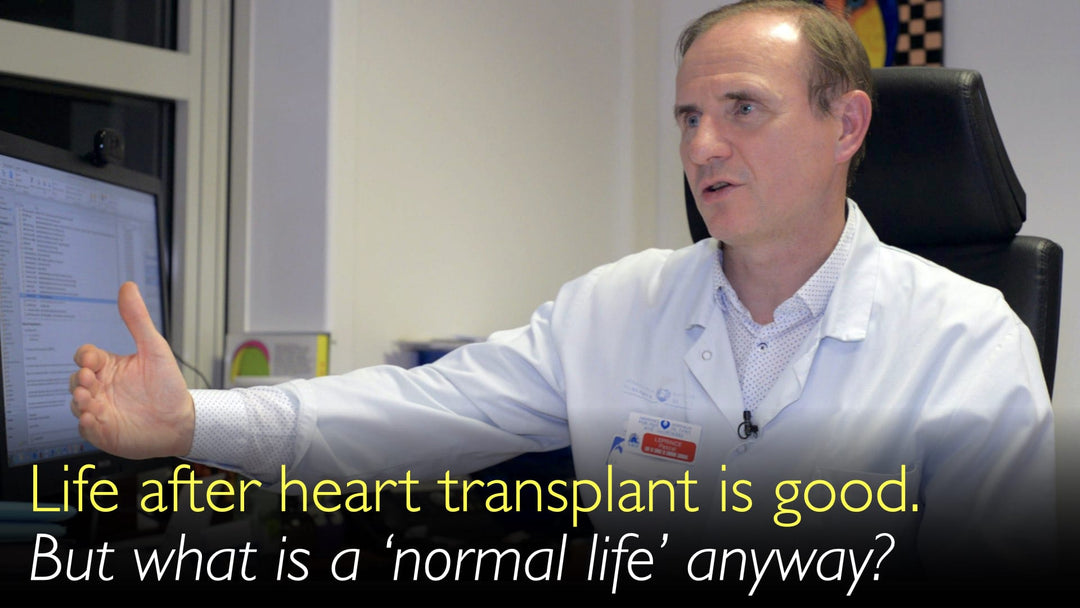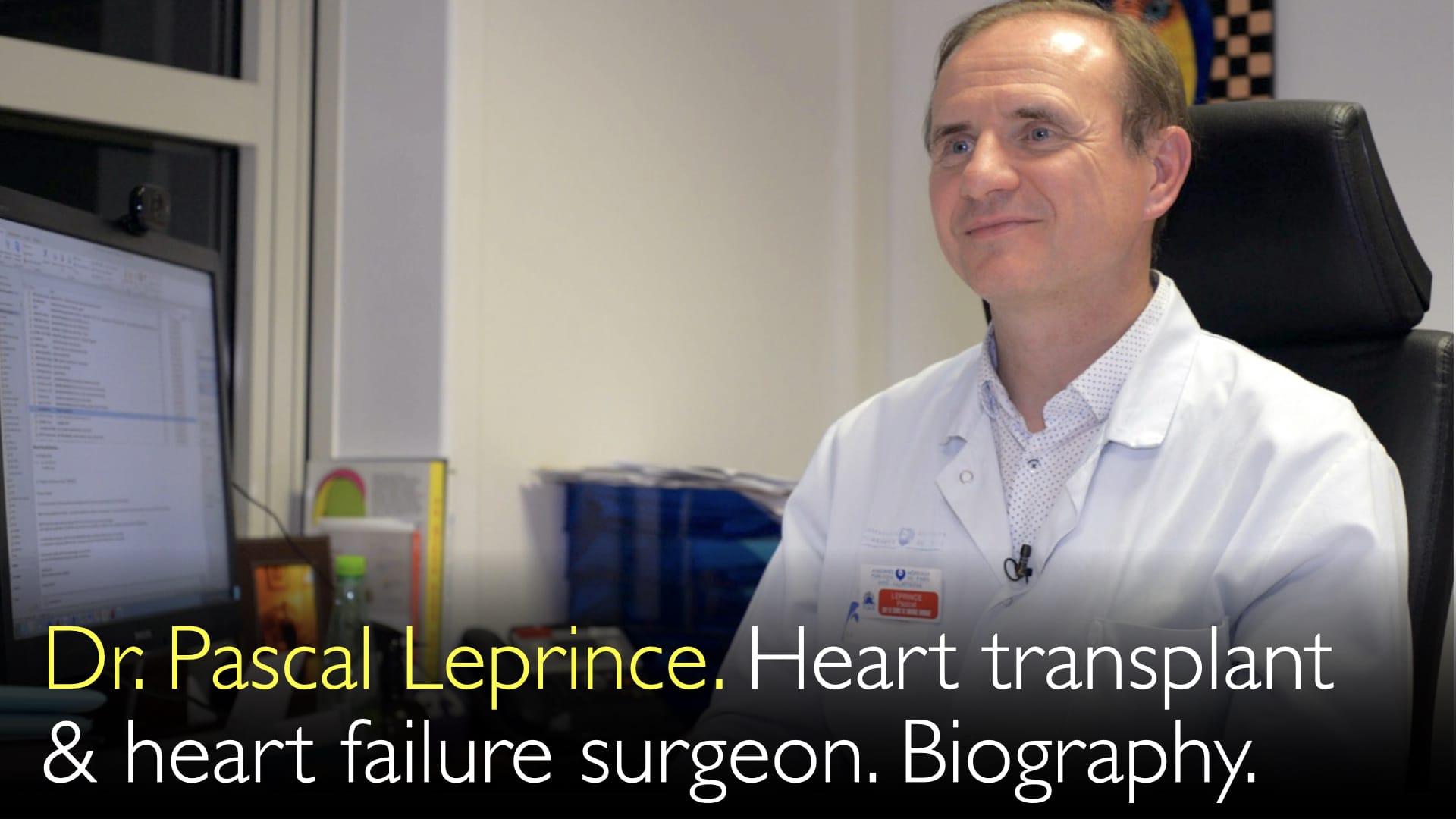מומחה מוביל בהשתלות לב, ד"ר פסקל לפרינס, MD, מסביר כיצד תמיכת ECMO (מערכת חמצון חוץ-גופית) לפני ואחרי השתלת לב יכולה להוביל לשיעורי הישרדות מצוינים ומדוע איכות החיים משתפרת משמעותית לאחר השנה הראשונה המאתגרת שלאחר הניתוח. הוא מפרט את האיזון הקריטי בין דיכוי חיסוני לזיהום, את הפוטנציאל להישרדות ארוכת טווח העולה על 30 שנים, ואת חוויית החיים החיובית הכוללת עבור מושתלי הלב.
ECMO וחיים לאחר השתלת לב: שיעורי הישרדות ואיכות חיים
קפיצה לפרק
- ECMO בהשתלת לב
- שיפור תוצאות מטופלי ECMO
- אתגרי השנה הראשונה בטיפול מדכא חיסון
- חיים ארוכי טווח לאחר ההשתלה
- איכות חיים לאחר השתלת לב
- תמליל מלא
ECMO בהשתלת לב
ד"ר פסקל לפרינס, MD, מנתח השתלות, דן בשימוש הקריטי של חמצון חוץ-גופי באמצעות ממברנה (Extracorporeal Membrane Oxygenation, ECMO) עבור החולים הקרדיאליים הקשים ביותר. ECMO מספק תמיכה circulatorית וריאתית חיונית לחולים לפני ואחרי השתלת לב. ד"ר פסקל לפרינס, MD, מציין כי צוותו החל לראות עלייה בשכיחות של תפקוד לקוי של השתל הלבבי סביב 2004.
זה הוביל לבחינת תוצאות ההשתלות שלהם בין 2004 ל-2011. נתוני ההישרדות של חולים שנזקקו לתמיכת ECMO היו מדאיגים בתחילה. ד"ר לפרינס נזכר ששיעור ההישרדות לשנה אחת של חולים שהיו על ECMO לפני ואחרי ההשתלה היה 72% בתקופה זו. זה היה נמוך משיעור ההישרדות הצפוי של מעל 80% עבור מושתלי לב סטנדרטיים.
שיפור תוצאות מטופלי ECMO
ד"ר פסקל לפרינס, MD, מדגיש כי התגברות על אתגרים אלה הייתה תוצאה של עבודת צוות מסורה ודיונים קשים בתוך הצוות הכירורגי. צוות השתלות הלב עסק בדיונים קריטיים על בחירת חולים ותוכניות טיפול לאלו על ECMO. תהליך שיתופי זה היה חיוני לשיפור הגישה שלהם למקרים המורכבים הללו.
תוצאות המיקוד המחודש הזה היו דרמטיות. ד"ר לפרינס מדווח כי לניתוחים שבוצעו בין 2012 ל-2017, התוצאות עבור חולי ECMO השתפרו משמעותית. שיעור ההישרדות לשנה אחת של החולים הקשים מאוד, שהיו על ECMO לפני ואחרי השתלת הלב שלהם, עלה ל-82%. שיעור הצלחה זה משתווה כעת לחולים שלא נזקקו ל-ECMO לפני ההשתלה, מה שמוכיח שצוותים רפואיים לעולם לא צריכים להרים ידיים משיפור הטיפול.
אתגרי השנה הראשונה בטיפול מדכא חיסון
היבט מרכזי בחיים לאחר השתלת לב כולל ניהול תרופות מדכאות חיסון. ד"ר פסקל לפרינס, MD, מסביר שתרופות חזקות אלה חיוניות למניעת דחיית איבר, שהייתה קטלנית. עם זאת, הן מגיעות עם תופעות לוואי משמעותיות, במיוחד במהלך השנה הראשונה לאחר ההשתלה כאשר המינונים הם הגבוהים ביותר.
האתגר המרכזי הוא איזון בין הסיכון לדחייה לבין הסיכון לזיהום. ד"ר לפרינס מתאר כיצד חלק מהחולים עוברים את השנה הראשונה עם מעט סיבוכים. אחרים, במיוחד אלה שהיו במצב קריטי ביחידה לטיפול נמרץ לפני ההשתלה, עלולים להתמודד עם זיהומים חוזרים. טיפול בזיהומים אלה דורש לעתים קרובות הפחתת הטיפול המדכא חיסון, מה שעלול then לעורר אירוע דחייה. ד"ר לפרינס מאשר לד"ר אנטון טיטוב, MD, שהשנה הראשונה היא לרוב הקשה ביותר עבור חולים, ודורשת תמיכה immense.
חיים ארוכי טווח לאחר ההשתלה
ד"ר פסקל לפרינס, MD, מציג פרספקטיבה מלאת תקווה לטווח הארוך, וקובע שיש "אור בקצה המנהרה". לאחר השנה הראשונה, החיים generally הופכים להרבה יותר טובים עבור מושתלי לב. תדירות הביקורים הקליניים הנדרשים יורדת, וחולים often חוזרים לחיים כמעט נורמליים. חלק מהחולים בקבוצת המחקר שלהם חיים עם לב מושתל מעל 30 שנים.
סיבוכים ארוכי טווח יכולים לכלול מצבים כמו סרטן או מחלת עורקים כליליים בשתל הלב. ד"ר פסקל לפרינס, MD, מציין כי חלק מהחולים may even יזדקקו להשתלת לב שנייה או שלישית. בעוד שהצוות selective יותר עם חולים מבוגרים due to ההשפעות המצטברות של טיפול מדכא חיסון ארוך טווח, השתלה חוזרת remains אופציה viaable עבור חלק, התורמת לשנים נוספות רבות של חיים.
איכות חיים לאחר השתלת לב
המטרה הסופית של השתלת לב היא איכות חיים טובה. ד"ר לפרינס דן בכך בלהט עם ד"ר אנטון טיטוב, MD, וטוען שהתפיסה הסובייקטיבית של חיים טובים היא מה שחשוב ביותר. הוא מהרהר שהמושג "חיים נורמליים" שונה עבור everyone ואנשים רבים without השתלות מתמודדים עם אתגרים משלהם.
ד"ר לפרינס מאמין firmly that חולי השתלת לב can and do נהנים מהחיים. הסיבה העיקרית להיות בחיים, הוא מסיק, היא ליהנות מהחיים as much as possible. Outlook חיובי זה מדגיש את הערך העצום של השתלת לב, not just בהארכת life, אלא בהפיכת life הזה לשווה חיים.
תמליל מלא
ד"ר פסקל לפרינס, MD: אנחנו מבצעים יותר השתלות לב בחולים חולים יותר. אנחנו must להתמודד עם תפקוד לקוי של איברים ותפקוד לקוי של שתל הלב after ההשתלה. This is why אנחנו משתמשים במערכת ECMO, שהיא תמיכה circulatorית. ECMO also helps עם תמיכה ריאתית after השתלת לב.
It is interesting. We started to experience in 2004 מספר גובר של בעיות תפקוד שתל הלב עם הלב המושתל. We looked at our transplantation experience between 2004 and 2011. During all these years, we were not fully happy with the result of cardiac transplantation.
The outcome of the patients who were on ECMO before transplantation was poor in comparison to the patients who had straightforward heart transplantation without being on ECMO before transplantation. Of course, patients did have ECMO after transplantation. I think I remember the one-year survival rate of the patient who was on ECMO before and after transplantation was 72% at one year, although heart transplantation survival rate is supposed to be more than 80%.
Again, this is interesting because this is teamwork. We talked all together. The discussion was pretty tough. In the heart transplant surgical team, you always have surgeons who want to push to one side and other surgeons who want to push the other side. This is good because in the end, we can be in the middle.
The discussion was very important. We discussed the patient selection for heart transplantation and talked about the patient treatment plan, and so on. We finally came with a recommendation for our team.
Interestingly, we recently looked at the outcome of patients who were on ECMO before heart transplantation and on ECMO after transplantation. Surgeries were done between 2012 and 2016 or 2017. We are back to normal results with a lower one-year death rate.
The patients who are on ECMO are very sick patients. They are on ECMO before cardiac transplantation, and now we keep them on ECMO after transplantation. Finally, the survival rate at one year is 82%. It is as good as the survival of other patients who were not on ECMO before transplantation.
This shows that medical doctors should not give up. Never, just never give up. Just try to find a way to improve what we do every day. This is teamwork; no one can do that on their own. That is very important.
This is the first problem, the first part of the side effects after cardiac transplantation. The second part of complications after cardiac transplantation relates to the patient's use of immunosuppressive medications. These side effects are organ dysfunction.
The patient went through heart transplantation and is doing better, but the patient will receive immunosuppressive medication. Those medications are tough, particularly during the first year after transplantation, because we use high doses of immunosuppressive medications to avoid any rejection.
Those medications have side effects. Again, if you don't give the immune suppressant medications to the patient, almost all of the patients will get a rejection of the transplanted heart and they will die. This is very important to give immunosuppressant medication on an everyday basis.
But those medications act against the defense of the patient, of course. The patient has a high risk of infection. This is always the balance between infection and organ rejection.
During the first year, some of the cardiac transplantation patients will have a very nice life with almost no complications. It is pretty easy to balance between rejection and infection in such patients.
Other patients, unfortunately, will have complications, particularly patients who were in the ICU before transplantation. Some of them will go through many infections. Then, because patients do have an infection, you try to lower the dose of immunosuppressive medication, and then patients will get an organ rejection.
I would say that the first year after heart transportation is not the best year of the life of the patient. It is pretty tough for patients. They have to get a lot of help to go through that.
What is interesting is this: there is a light at the end of the corridor. After one year, life is becoming better and better. Then heart transplant patients have a pretty good quality of life. The rate of clinic visits that they have to go through becomes lower.
Patients just have an almost normal life. This is the third part of complications after heart transplantation. Some patients will go through all the complications.
This is interesting. In our cohort, some of the patients were transplanted with a new heart more than 30 years ago. They are still alive and doing pretty well; they still have ongoing life. This is good.
Some other patients will go through other diseases. You can have cancer, or you can have a coronary artery disease of the heart graft. Some patients will require another heart transplantation. Some patients can go through a second or even third heart transplantation.
Of course, we are more selective as patients get older. Older patients after heart transplantation have many years of immunosuppressive medications. They are pretty powerful medications, but anyway, some patients can be re-transplanted one or two times.
This is not a bad life. I'm not sure this is a normal life, but I don't know what a normal life is. Many patients have some disease, or even if they don't have any disease, life is not easy for many patients in the world.
Who has a normal life? I don't know. Normality is something different from one person to another, but I think heart transplant patients do have a good time anyway.
It is very important: the quality of life, the subjective perception of the quality of life. That is very important. Life is to be enjoyed, enjoyable. Otherwise, there is no reason to go through life.
The main reason to be alive is just to enjoy life as much as we can.





